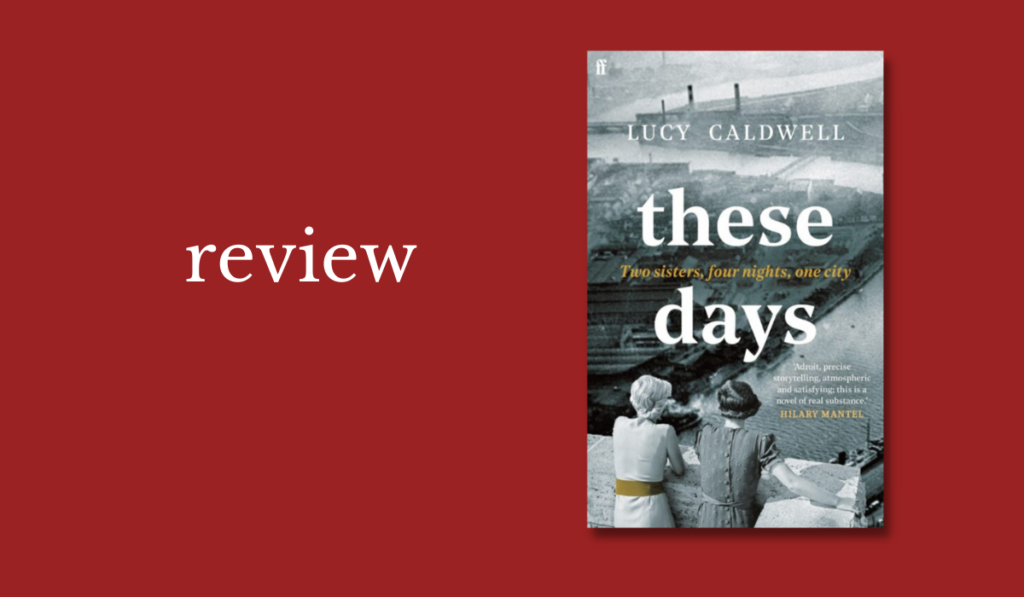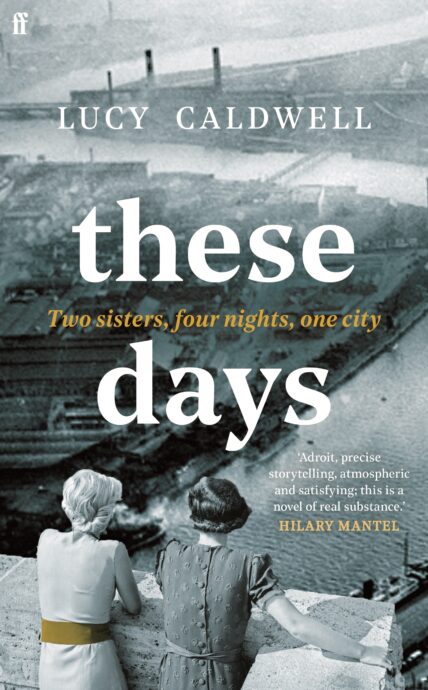
These Days|Lucy Caldwell|Faber|ISBN:978-0-571-37130-3|£12.99
Enthralling, immersive and an essential text on Belfast during the Second World War—Susan McKeever on These Days, by Lucy Caldwell.
by Susan McKeever
In the late nineties I made frequent trips up to Belfast to acquire goods that were not available in Dublin at the time: IKEA kitchenware, napkins, colourful bedding and glasses, exciting Decathlon sports equipment, exotic-seeming clothing from the lush Victoria Square shopping centre. I’d even fit in a trip to Sainsburys to get foodstuffs that just weren’t available yet in the South.
In Chapter ten of Lucy Caldwell’s first historical novel, These Days, the very reverse is described: a train full of Belfast shoppers are on their way back from a trip to Dublin to get goods that were not available in the North at the time:
‘You can still get everything in Dublin, everything you want, anything you can think of.’
A little girl in the shopping party consumed a peach melba in Bewley’s smothered in fresh cream, and bought her daddy a shaving kit. The shops of Grafton Street were lit up and full of enticing displays.
During World War Two, Northerners were denied all luxury foods and everything was rationed. Despite the wealth of luxuries in the capital, the girl’s mother declares that ‘it wouldn’t feel right to live in Dublin, not in a peace purchased at other people’s expense, while others just a few miles north suffer so’.
Belfast Blitz
It is to my shame that most of what I learned about the Belfast Blitz came from Lucy Caldwell’s enthralling, immersive account of three devastating raids on Belfast by the Luftwaffe in April and May 1941 which left the city decimated, killing and horribly injuring hundreds of innocent civilians.
From the start, in a story told through the eyes of a well-do-do family, the Bells, the wartime vocabulary in These Days is just part of daily life: blackout blinds; sirens; gas masks; incendiaries; ration books; bomb shelters; First Aid posts; barrage balloons; All Clear.

Dockside Raid
Belfast has so far remained relatively unscathed by attacks. When the Dockside Raid kicks off, the family, unused to real threat, scramble to shelter ‘in a bloody wee cupboard under the stairs while the world ends around us’.
Florence and Philip Bell have three children: Audrey, who’s just turned twenty-one, Emma, who is nineteen, and young Paul, who’s thirteen.
The two sisters are the real protagonists of the novel, and we learn their innermost thoughts and longings in the background of the raids.
Sisters
Emma is feisty, and ultra-keen to actively help in the war effort, volunteering at a First Aid post and desperate to accompany her doctor father to the hospital to help during the first raid.
She is in a clandestine relationship with workmate Sylvia, ten years her senior, and is full to the brim with the lust and longing of first love.
Audrey, to some extent the more traditional of the two, is engaged to Richard, a doctor like her father—but subtle clues imply that she’s not quite willing to have her life safely mapped out as a doctor’s wife.
Richard can only be described as ‘wet’. When she wants to go further than chaste kissing after a night out, struggling to ‘unbutton his flies’, he becomes so flustered that it seems he’s going to cry.
Young Paul is a tangental character, and it is interesting to juxtapose his view of the war with those of the others.
He follows the news bulletins doggedly and, as if playing an elaborate board game, places pins of different colours on his map of the world on his bedroom wall to track the battles and the troops. He wishes the war would go on another few years so he’ll be old enough to be a Spitfire pilot.

‘Belfast is finished’
The Easter Raid is more serious. Hundreds are killed, and afterwards, Philip describes to Florence some of what he saw at the hospital: ‘… patients who’d had their limbs amputated by wardens with hacksaws … a man whose both legs had been burned right through to the bone, the bones themselves like charcoal …’; a man who was decapitated and recognised by a nurse from his boots.
People have just begun to catch their breath, to bury their dead, when the Fire Raids hit in May.
Children have already been evacuated to the countryside in a programme outlined in the Belfast Telegraph, to safe havens outside the city like Ballycarry, Castledawson, Portrush and Portstewart. Drinks parties have started again among Philip and Florence’s set in an effort to restore morale.
Then on a fine May night, close to 100,000 incendiaries are dropped all over the city – more than in almost any raid over the whole of the UK.
The docklands are destroyed. Whole streets disappear and Caldwell names them in a rote list which cements the dread as we read: Chater Street, Witham Street, Crystal Street, Tower Street, Westcott Street – gone. ‘Belfast is finished,’ are words repeated on the survivors’ lips.
An essential text
Throughout the narrative everyday domestic life is woven between the three raids – the cauliflower pie to be attempted by housekeeper Mrs Price for the Bells’ tea; digging for victory with the lawn cut into vegetable beds; the ‘sweet, rank smell’ of tomatoes in the greenhouse, the unbelievable bounty of an Easter lunch consisting of ‘two roast chickens, heaps of potatoes and gravy… the last of the bottled gooseberries’. Mrs Price dreaming of her day off on Easter Monday when she will travel with her family to Bangor to eat periwinkles and ‘bags of dulse, gritty with sea salt’.
This novel should be prescribed reading on the Irish curriculum: These Days has taught this Southerner more about Belfast than I ever learned at school.

Susan McKeever is an editor, writer and ghostwriter for several Irish and international publishers and authors. She works from her home in the red-brick heart of Dublin’s Portobello. @MckeeverSusan,susanmckeever.biz












